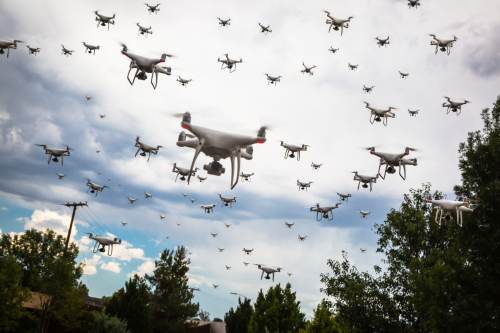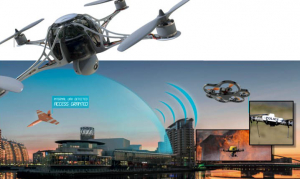NG Aviation SE
Czechia


Irish Space technology company, Skytek, has cemented a multi-million euro partnership with one of the world’s largest insurance brokers, Aon, to provide space-adapted surveillance technology for tracking marine assets in real-time.
The ‘Next Generation Recognised Maritime Picture’ or NG-RMP involves the integration of diverse, novel and emerging data sources to improve vessel data, and has been developed with the expert backing of the European Space Agency (ESA).
The rise of mega-ports and a recent sharp increase in vessel capacity has created a greater need to monitor movement and estimate cargo accumulation – now a critical part of risk management for insurance companies. NG-RMP allows for enhanced underwriting and reinsurance programmes by providing live monitoring of insurers’ marine risks and identifying accumulations.
The NG-RMP Project grew out of Skytek’s ESA-supported demonstration project working with the Irish Naval Services (INS). Navies are responsible for monitoring the movements of vessels in coastal waters and checking for any unusual activity. For accurate surveillance, it is necessary to generate a ‘Recognised Maritime Picture’. This picture has traditionally been achieved by merging information collected from various sources such as radars, warships, patrol aircraft, drones and other control systems.
In 2015 a joint Skytek/ESA demo project developed a ‘Next Generation’ Recognised Maritime Picture system. The system was created in close collaboration with the INS and is now operational – with the aim of enhancing the early detection of suspicious or unusual behaviour by vessels. NG-RMP improves on previous approaches by combining SAT-AIS data, CCTV footage (available in major ports), and vessel data from port and shipping authorities using advanced algorithms, leading to a more targeted and efficient use of naval and coastguard resources.
Aon’s new consultancy is based on NG-RMP – where real-time satellite tracking will allow insurers and reinsurers to visualise the precise location of their insured risks, alongside crucial vessel and cargo information.
Dr Sarah Bourke, CEO at Skytek, said:
“The ability to take vast amounts of earth observation and space-based data and create tailored insurance products was inconceivable only a couple of years ago. These new products now open up an exciting future for deeper risk insights within the marine re/insurance world and beyond. Aon and Skytek are already developing transparent algorithms to determine cargo exposures at ports in real-time, using the latest earth observation technology alongside the latest AI and Machine Learning techniques.”
“This is a ‘double win”, explains Piera Di Vito, the project’s Technical Officer at ESA: “The success of this system has now found a large customer interested in marine information and therefore a commercial application. It’s very rewarding to see a practical application of science to the insurance industry – and in turn support ship and cargo owners globally to have confidence in the protection of their assets.”
Aon is one of the largest insurance brokers in the world based on revenue and the Aon group employs 50,000 people in 120 countries.
Skytek is one of Ireland’s leading space technology companies. The firm’s International Procedure Viewer (iPV) system has been used on the International Space Station for over 10 years.
Postbus 1800
1000 BV Amsterdam
Netherlands

The Gatwick incident at the end of 2018, which rescheduled Christmas for 140 000 passengers and saw 1000 flights cancelled, might have been avoided, had the airport been equipped with an integrated detection system such as escCUAS™, developed as part of the European Space Agency’s ‘DroSecMa’ project. DroSecMa uses a combination of space assets, terrestrial systems and integrated best in class sensor/software technology to deliver a solution specifically tailored to each customer’s needs.
DroSecMa is a project led by esc Aerospace GmbH, supported and co-funded by the German Aerospace Center (DLR). It provides state-of-the-art drone technologies for enhanced surveillance and inspection.
“Drones, like a lot of technologies, are a mixed blessing”, says Fausto Vieira, Technical Officer at ESA. “With them, we can fly/transport things to remote places and access areas that are dangerous to human beings – providing huge benefits in many sectors, from agriculture to tourism. But this technology can also be abused.”
The recent increase in drones has created a heightened need for drone detection. “Just a couple of years ago, there were only around 5-8 companies providing drone detection systems,” says Lars Weimer, COO of esc Aerospace GmbH. “Now there are more than 300 companies worldwide providing some kind of drone detection and/or mitigation capability … The issue is that no supplier has a system that does the trick in all cases.”
“In Gatwick’s case, the system only had the capacity to detect drones from a single manufacturer, the market leader – which covers 70-80 per cent of the market. It couldn’t detect the other 20-30 per cent of drones from other manufacturers or drones that had been modified or custom built,” he adds. “It’s said that 100 per cent detection is not possible, but with DroSecMa we can significantly improve detection to 90 per cent or higher.”

DroSecMa uses a mix of different sensors and sensor fusion technologies: “This enables the system to detect a greater number of drones from different manufacturers,” says Weimer. “Because the drones at Gatwick were not of the type that the system could recognise, the operators had to rely on visual sightings before finally bringing in a military system. DroSecMa can detect a greater variety of drones more reliably, can track the drone, and in many cases, identify the position of the pilot.”
Vieira adds: “Patrol and surveillance drones equipped with satellite communication, provide data and communication links in areas where no other networks are available, or where there is insufficient bandwidth. GNSS provides position data for localisation of intruding drones or guidance of surveillance/inspection.”
ESA and esc Aerospace GmbH are now looking at incorporating advanced ‘counter-measures’ to not only detect but also mitigate potential threats. DroSecMa already offers jamming and spoofing technologies. But counter-measures face technical as well as regulatory challenges, since they need to be defined in a legal framework that can adapt to a very dynamic technological landscape.
“I’m very happy with the collaboration between esc Aerospace and ESA, says Weimer; “our open dialogue provides support, contacts, and context. This brings a different perspective, which helps to shape our technical innovations and focuses us on real-world customer needs. We have hired more personnel and, after just one year, have sold three systems with sale value in the six figure range – this is a fantastic result. And…within one month of the Gatwick incident, we had everyone calling!”